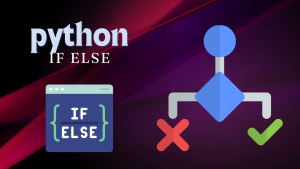The elif keyword in Python provides a powerful way to create complex conditional statements that allow you to execute different blocks of code based on multiple conditions. Think of it as a way to add "else if" conditions to your code, making it more versatile and efficient.
Understanding elif
Let's break down how elif works:
-
The
ifStatement: Theifstatement serves as the starting point. It evaluates a condition. If the condition is True, the code block associated with theifstatement is executed. -
The
elifChain: Theelifkeyword comes into play when you want to check additional conditions. Eachelifstatement comes after theifstatement and introduces a new condition to evaluate. If the previousifcondition was False, Python checks theelifcondition. If it's True, the code block associated with thatelifis executed. -
The
elseStatement (Optional): Theelsestatement is an optional part of theif-elifchain. It acts as a catch-all, executing its code block only if all previousifandelifconditions were False.
Syntax of the elif Statement
if condition1:
# Code to execute if condition1 is True
elif condition2:
# Code to execute if condition1 is False and condition2 is True
elif condition3:
# Code to execute if condition1 and condition2 are False and condition3 is True
else:
# Code to execute if all previous conditions are False
Examples of Using elif
Example 1: Simple elif Chain
grade = 85
if grade >= 90:
print("Excellent!")
elif grade >= 80:
print("Great job!")
elif grade >= 70:
print("Good work!")
else:
print("Keep trying!")
Output:
Great job!
In this example, the grade variable holds a value of 85. The if condition (grade >= 90) is False, so Python moves to the elif condition (grade >= 80). This condition is True, so the message "Great job!" is printed.
Example 2: elif with String Comparison
day = "Monday"
if day == "Saturday":
print("Weekend!")
elif day == "Sunday":
print("Weekend!")
else:
print("Weekday")
Output:
Weekday
Here, the day variable holds the value "Monday". The if and elif conditions are both False, so the else block executes, printing "Weekday".
Interesting Fact About elif
The elif keyword is a shorthand for "else if." It makes your code more readable and concise. Before the introduction of elif in Python, you would have to use nested if statements to achieve the same functionality.
Conclusion
The elif keyword is an invaluable tool in Python programming, offering a streamlined way to create sophisticated conditional statements. It allows you to evaluate multiple conditions elegantly, making your code more adaptable to varying situations. By mastering the use of elif, you can write more efficient and expressive code for a wide range of applications.



